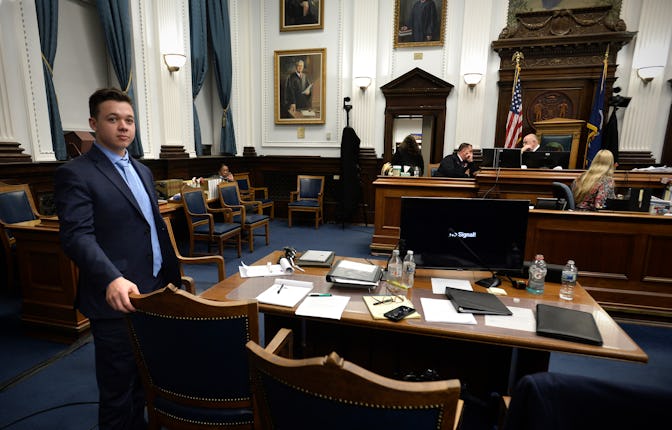After killing 2 people in Wisconsin, Kyle Rittenhouse was just acquitted on all charges
The then-17-year-old traveled across state lines to patrol social justice protests with an AR-15.

Jurors on Friday found 18-year-old Kyle Rittenhouse not guilty on all counts of murder and reckless endangerment, more than a year after Rittenhouse killed two social justice protesters during the days of unrest following the police shooting of Jacob Blake, a Black man, in front of Blake’s family. Rittenhouse, then 17, had traveled to Kenosha, Wisconsin, the site of the protests, from his home in Antioch, Illinois, armed with an AR-15 rifle.
Rittenhouse, whose teary testimony was widely seen as one of the major signs he would ultimately be acquitted, visibly wept as the successive not guilty verdicts were read aloud.
Rittenhouse initially faced six charges, including first-degree intentional homicide and attempted first-degree intentional homicide. A charge of unlawful possession of a weapon as a minor — thought to be one of the charges most likely to secure a conviction — was dismissed earlier this week by the judge on a technicality based on the type of firearm he’d used. The jury then found Rittenhouse not guilty on the five remaining counts.
Rittenhouse’s trial had been punctuated a number of bizarre moments — largely on the part of Circuit Court Judge Bruce Schroeder — that shaded the proceedings in a decidedly skewed light. At various points during the trial, Schroeder asked jury members to applaud for one of Rittenhouse’s defense witnesses (a veteran, on Veteran’s Day), ruled that the men Rittenhouse shot and killed couldn’t be referred to as “victims” (“rioters” and “looters” was allowed, though), and, in a particularly strange episode, spent an inordinate amount of time demonstrating his absolute inability to understand how iPhones work. At the same time, Schroeder openly berated the lead prosecutor as “brazen.” People familiar with Schroeder’s courtroom habits have said he tends to be favorable toward the defense.
In the months since Rittenhouse killed Anthony Huber and Joseph Rosenbaum (a third victim, Gaige Grosskreutz, survived his injuries), he has become something of a folk hero for huge swaths of the right, who have been eager to portray a child who crossed state lines, picked up an assault-style rifle from a friend, and lied about what he was doing miles from home, as someone who merely “defended his community.” An unnamed man speaking with MSNBC on the steps of the Kenosha courthouse after the verdict was read called Rittenhouse “our young hero Kyle” and said his acquittal was a victory for the Second Amendment.
Within minutes of the acquittal, far right figures across the internet began publicly celebrating Rittenhouse’s not guilty verdict. Social justice advocates, meanwhile, began agonizing at the precedent set by the verdict, lamenting how it could lead to future right-wing violence against protesters and activists. Huber’s family said in a statement that the verdict “sends the unacceptable message that armed civilians can show up in any town, incite violence, and then use the danger they have created to justify shooting people in the street.”
Last weekend, Wisconsin Gov. Tony Evers (D) activated 500 members of the Wisconsin National Guard in preparation for the Rittenhouse verdict. Protesters began massing outside the Kenosha courthouse on Tuesday, when the jury began deliberations.
This is a breaking news story and has been updated.